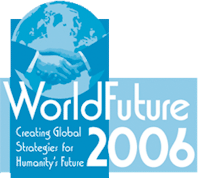 I was at the annual World Future Society conference this weekend manning a table for the World Transhumanist Association. The theme of this year’s conference was “Creating Global Strategies for Humanity’s Future.” Key speakers included Ray Kurzweil, Joel Garreau and Walter Truett Anderson.
I was at the annual World Future Society conference this weekend manning a table for the World Transhumanist Association. The theme of this year’s conference was “Creating Global Strategies for Humanity’s Future.” Key speakers included Ray Kurzweil, Joel Garreau and Walter Truett Anderson. At our table I had a number of WTA brochures, including literature promoting the WTA’s annual TransVision conference which will be held at Helsinki from August 17-19. I also brought along literature promoting the Institute for Ethics and Emerging Technologies, Betterhumans, and local groups like the Toronto Secular Alliance. I was also fortunate to have the assistance of a couple local volunteers. I was hoping to do some live blogging, but the WiFi connection at the hotel was utterly inadequate and virtually non-existent.
The WFS conference, which boasted upwards of 1,000 attendees, was held at the Sheraton Centre in downtown Toronto. At any given time during the 3-day conference there were 5-10 presentations running simultaneously, with topics touching upon such themes as business and careers, future methodology, resources and the environment, technology and science, and values and spirituality. There were a number of table-top displays in addition to our own, including other futurist groups and new age style religions. There were also a number of students at the conference, including a very friendly and enthusiastic group from Venezuela [thanks for hanging out with us, guys].
Having never been to a WFS event before, I wasn’t sure what to expect—particularly from the perspective of an exhibitor. While the conference theme was largely about “humanity’s future,” my sense going into the conference was that the WFS crowd would be more conservatively minded and more focused on near-term and business related issues.
For the most part this proved to be largely true, but overall I’d have to say I was impressed with the futurists at the conference. Terms that echoed in the conference rooms included the usual suspects: AI, nano, MEMS, virtual reality, and cybernetics. For this particular audience, most of whom were interested in corporate futurism, the idea of ‘enhancing’ human capacities was a given. I got the sense from several attendees that the ‘transhumanism’ moniker wasn’t completely necessary.
This was somewhat revealing for me, mostly because I spend a significant amount of my time addressing criticisms and fears as they pertain to human enhancement. Coming from the perspective of the corporate and futurist world, the enhanced human future is largely assumed. This attitude, while laudable in some respects, is disturbing in another; bioethics is largely absent in the corporate vernacular.
These conference attendees were certainly not a random sampling of society; very few people appeared openly shocked or appalled about human enhancement. That’s not to say that there weren’t detractors or voices of caution – there were certainly many different voices heard at the event. What was revealing, however, was that no one was hysterically opposed to the transhuman future.
Well, perhaps that’s not entirely fair. We did get a couple of real “live ones” at our tabletop.
I shouldn’t give the impression that this was a purely business oriented conference. There were many futurists and forward thinkers present who were genuinely interested in some of the broader existential, philosophical and ethical issues pertaining to humanity's future. What surprised me, though, was the new age feel of some of the presenters and exhibitors. In my mind, it seems that scientific literacy cannot be assumed among all futurists and WFS members.
As for the quality of the presentations, they were generally uneven. Some were genuinely mind enhancing (the virtual teams panel was excellent), while others were mind-boggingly idiotic. “Futurism lite’ would be too kind a term to describe some of the more pedestrian and boosteristic presentations.
As for our WTA tabletop, most people who came to our table quickly scanned our literature, avoided eye contact, and moved on. But a good number of them eagerly scooped up our material and initiated conversation. We moved a serious amount of literature—hundreds and hundreds of pamphlets, booklets and pages—the most I’ve ever distributed at a single event. A number of passers-by engaged me in lengthy conversations, sometimes as long as half an hour. I was glad to participate in these discussions and describe and defend transhumanist thought, but it made for a rather exhausting couple of days. And add to that the after-parties at the pubs, sleep was at a premium for me.
One last note: this was my first opportunity to hear Ray Kurzweil speak live in person. He is truly an amazing speaker and an even more amazing individual.
Thanks go out to all the people who helped me with the WTA tabletop, and a special thanks goes out to the WTA who made it possible.

No comments:
Post a Comment